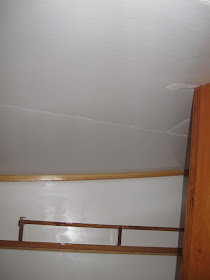There's been a whole lot of painting going on, so in many ways not a lot to show for the couple of weeks since last I blogged.
The little bulkheads that support the settee base are now painted and you can see that what will be the lift-up bunk extension, is fitted between the two athwartships seats. It's just sitting there at the moment while I try and source 'flat' bolts to fasten it in place.
These two bulkheads are simply to divide the lockers into smaller spaces, to make them more manageable. I did debate not painting them, but keep reminding myself that lockers with light interiors are easier to find things in.
And there were four coats of paint to apply to the deckhead, before it could be fitted.
I had originally intended to make the top of the dinette area out of one piece of ply, but manhandling the larger of the sheets of ply for the deckhead put paid to that notion. I guess it's a more efficient use of ply, anyway, to make it in three pieces. More coating.
Filletting in the partition bulkheads. It's easier to paint them in situ because I can do both sides at once.
The seat tops have to be chamfered along their outboard edge to (more or less) match the angle of the hull. I'm a bit more confident with the power plane than I was two years ago.
Finally I was ready to fit the deckhead liner. This is part of the deck structure, so has to be glued into place with epoxy. Because I don't want it full of screw holes, it was a bit of a mission to get it snug to the deck beams, which have a strong camber. It's just as well the temperatures have fallen by 10⁰ or so, or the glue would have kicked off long before I finished the job.
The deckhead installed. Although I had fitted it several times previously, I managed to produce a wee crack in it next to the tabernacle. I've filled this and will touch it up with paint next time I have some mixed. No doubt it will irritate the soul out of me for the next x number of years while I lie in my bunk.
And here is a shot from the outside showing the deckhead fitted. The forecabin is now closed in - or would be if only I'd finish cleaning up those portholes!
Some time ago I posted about the lovely little stove I'd bought from the UK. However, it had no window and this was a sad thought. Some time ago, my friends, Phil and Mark again showed me their stove on Icebreaker and it was a lot smaller than I remembered and has a wonderful window. I looked for ages to find the builder's details, without success: he doesn't normally bother to advertise. However, fortunately, P&M still had his phone number, so I called and ordered one. Somewhat to my consternation, he made one there and then, which did nothing for my budget. I really can't afford it, but on the other hand, I'll get so much pleasure, sitting in my saloon on a cold winter's night (and don't believe what they tell you about the 'Winterless North'), watching the flames flicker in my little Flick stove.


















